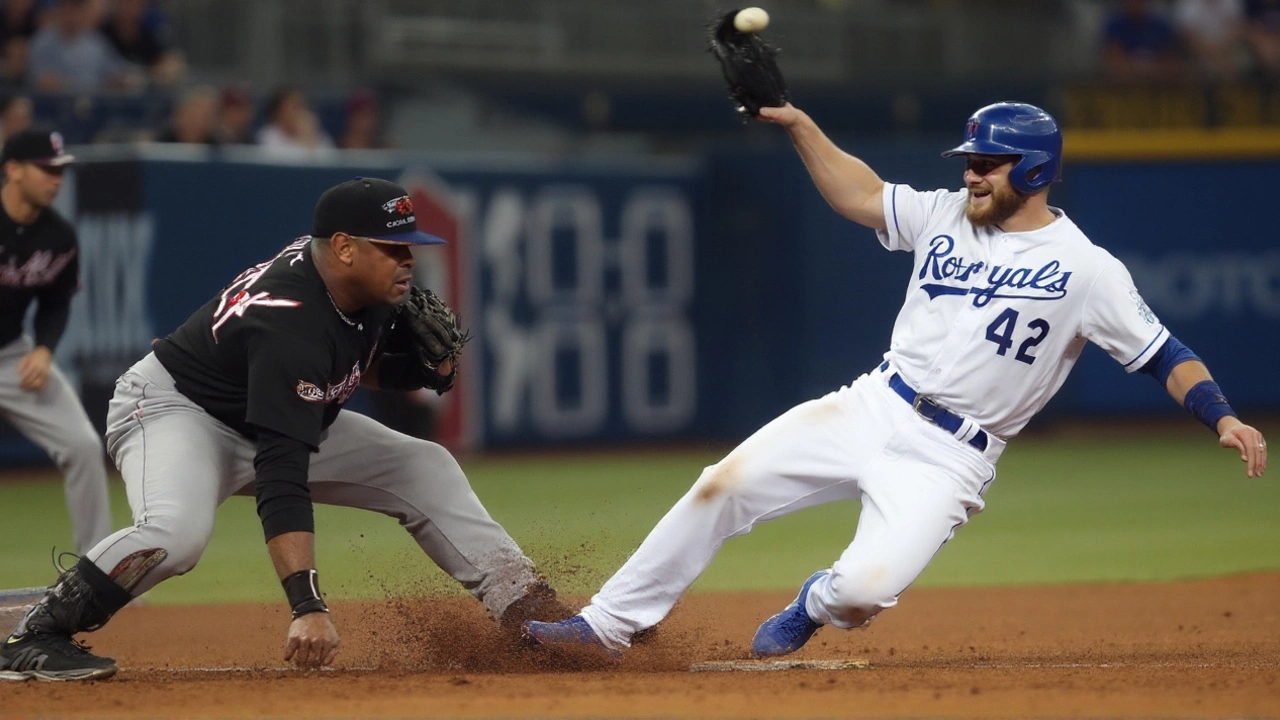
Buehler sets the tone, Harper flips the game
The debut was the headline, but the night became a full-on statement. In his first start for Philadelphia, Walker Buehler gave the Phillies exactly what a contender wants in mid-September—five sturdy, composed innings, a quiet early exit, and a dugout that could swing free knowing the game was under control. Philadelphia did the rest, thumping Kansas City 8-2 at Citizens Bank Park and pushing its winning streak to five.
This one clicked into place after a shaky opening. The Royals punched first when Maikel Garcia shot an RBI single in the first, scoring Bobby Witt Jr. for a 1-0 lead. Buehler didn’t flinch. He leaned on pace and location, kept traffic light, and bought his lineup time. By the second, Rafael Marchán’s sacrifice fly wiped the slate clean. By the third, the lineup was humming.
Bryce Harper supplied the jolt. With one on and one out in the third, Harper uncorked a towering 400-foot drive to left-center, a swing that felt equal parts release and reminder. It put the Phillies up 3-1, flipped the pressure back on the visitors, and cracked open Kansas City’s plan to grind the game. Two batters later, Owen Kemp added an RBI single to score Nick Marsh, and the Royals were suddenly chasing.
Philadelphia didn’t stop there. In the fourth, Harrison Bader ripped a double into right to plate Marchán, and Kyle Schwarber followed with an RBI double of his own, sending Bader home for a 6-1 cushion. This wasn’t death by a thousand singles; it was quality at-bats layered on top of timely damage. The Phillies won counts, punished mistakes, and kept the line moving.
Kansas City finally scratched back in the seventh when Bobby Witt Jr. grounded out to first to bring home Jac Caglianone, trimming it to 6-2. The answer from Philadelphia was immediate and loud. Bryson Stott turned on a pitch and sent a 391-foot shot to right-center, driving in Weston Wilson and restoring the six-run margin. The Royals were running out of innings, and the Phillies made sure there was no path back.
The final line told the larger story: a balanced offense, a composed debut by Buehler, and a bullpen that handled the last four frames with minimal stress. The Phillies climbed to 88-60 and kept their grip on the top of the National League East. The Royals fell to 74-74, holding in place in the AL Central while still living on the edge of the postseason picture.
For Buehler, this first step in red pinstripes mattered. The two-time All-Star, long known for October poise with the Dodgers, arrived in Philadelphia as a late-season stabilizer. His job wasn’t flash; it was foundation. Five innings, one run allowed, and the runway for a lineup already playing with force. The velocity looked healthy, the breaking ball was there when he needed it, and his tempo set the rhythm of the night.
What did the Phillies ask of him? Keep it simple: fill the zone, trust the defense, and hand the game to a bullpen that’s been sharper during this win streak. He did all three. Even after the early Royals run, Buehler avoided the big hit and pushed Kansas City into soft contact. The most notable part of his night wasn’t a single pitch—it was the steady cadence that told the dugout, “You’ll have your chance.”
That chance arrived in waves. Harper’s swing was the pivot, but the supporting cast kept stacking quality. Kemp’s opposite-field single, Bader’s gap power, Schwarber’s quick bat on a mistake—each push gave the next hitter a simpler job. By the time Stott’s late two-run blast landed, the mood had shifted from tense debut to comfortable cruise.

How the game turned, what it means, and what’s next
From Kansas City’s perspective, the early punch didn’t land hard enough. Witt Jr. reached and scored in the first, Garcia kept pressure on with the RBI knock, and for a moment the Royals had the game tilted. After that, they couldn’t string it together. Buehler kept first-pitch strikes coming, and the bullpen ate innings without opening doors. The seventh-inning run was manufactured, not loud, and it came with a six-run hill to climb.
The Royals’ path this month is clear: they need their top-of-the-order speed to become rallies and their young power to turn mistakes into crooked numbers. On this night, they didn’t get either consistently. The lineup chased a bit more as the score widened, and their best contact came with the bases empty. When they did pressure, the Phillies controlled the damage—one run here, a groundout RBI there, and little else.
Philadelphia, meanwhile, looked like a team that understands the calendar. This was not a hero-ball win. It was five stress-light innings from the starter, relentless middle-innings offense, and a bullpen that traded strike-throwing for quick outs. Managerial decisions matched the scoreboard: pinch-hit spots used to lengthen innings, defensive tweaks to back the pitching plan, and relief changes that cut off any hint of momentum.
Context matters here. The Phillies are in a race they expect to win, and this stretch has the feel of a team refining small edges for October. The defense backed the staff, the lineup punished fastballs over the plate, and the baserunning stayed smart—aggressive on contact, disciplined when the count favored the hitter. When Harper’s ball left the yard, you could feel the inning extend before the next pitch was thrown.
For Buehler, the debut is a checkpoint more than a peak. Philadelphia doesn’t need him to go nine or chase strikeout totals; it needs him to be the adult in the room every fifth day. The curveball had bite, the cutter played off the four-seam, and his ability to change eye levels—upstairs to set up soft grounders—fit nicely with a ballpark that punishes fly-ball mistakes. As the innings build, the Phillies can monitor workload without risking rhythm, especially with a bullpen that’s been getting cleaner late.
The offense deserves its own spotlight. Harper’s home run mattered because it turned a tie game into a chase game. Once forced to play from behind, Kansas City’s pitching had to live in the zone, and Philadelphia won those matchups. Schwarber’s double was a classic piece of situational hitting—hunting something up and in and getting it. Bader’s swing stayed short and quick through the gap. Stott’s late homer was the exclamation mark on an approach that never got reckless even with a big lead.
Credit the bottom of the order, too. Marchán’s sacrifice fly in the second tied things and changed the dugout mood. Kemp’s RBI in the third extended the inning that Harper started. Weston Wilson’s seventh-inning appearance set the table for Stott. Not every game script features stars in every frame; this one had contributions stacked from one through nine.
Kansas City still has time to write a different story. The Royals sit third in the AL Central with a record that leaves the door open, but not by much. They’ll need to tighten innings like the third and fourth—where this game got away—and find ways to win the margins. That can mean better strike-to-ball patterns early in counts, or committing to a small-ball inning when the big swing isn’t there. With Bobby Witt Jr. at the center of everything they do, the blueprint is obvious: get him on, move him, let the middle of the order turn the lineup over with traffic.
Philadelphia’s blueprint is just as clear, and it showed up pitch after pitch. They controlled the zone at the plate, didn’t give away outs on the bases, and let their pitchers work ahead. Buehler’s debut slotted seamlessly into what has been a five-game heater, and the bullpen did what good bullpens do in September—pound the zone, change eye levels, and make hitters beat three or four good pitches in a row.
Zoom out, and the night checks a handful of boxes that matter this time of year. A marquee addition looked comfortable. The star in the middle of the order changed the game with one swing. Role players delivered the connective tissue that turns innings into rallies. And the defense and bullpen were tidy enough to keep the pace in Philadelphia’s favor from the third inning on.
By the numbers, the shape of the game was simple:
- Win streak: Five straight for Philadelphia, who continue to set the tone in the NL East.
- Power swings: Harper’s 400-foot blast broke it open; Stott’s 391-foot shot erased Kansas City’s late push.
- Middle innings: A three-run third and two-run fourth put the Royals in chase mode.
- Run prevention: One Royals run in the first, one in the seventh; little traffic otherwise.
Citizens Bank Park has seen its share of loud September nights, and this had that playoff-trial feel. Every at-bat mattered, even with a wide margin late, because this is when teams bake in habits they need in October. The Phillies tracked counts, tore into mistakes, and defended in rhythm with their pitching plan. The Royals had spurts, but not enough stacked quality to threaten late.
As the series continues, Philadelphia has the advantage of form and health, and the pleasant new variable of Buehler in the rotation. Whether he slots as a playoff starter or the tone-setter for a series, nights like this are the audition you want: clean, efficient, and scalable. Kansas City, hovering at .500, remains in the mix if it converts early chances into crooked numbers and pulls the ball in the air with men on.
No one game decides a race, but some games reveal who’s ready for the calendar to flip. On this night, the Phillies looked ready. They had the starter who steadied them, the star who flipped it, and the depth that kept pushing. On the other side, the Royals saw the template they’ll need to beat: disrupt the rhythm early, deny the quick strike, and force the long inning on their terms.
The rest of the weekend at Citizens Bank Park should tell us more. But if you wanted a first look at how Buehler fits, how Harper is seeing it, and how this lineup stacks punch after punch, Friday offered a clear answer. This was the kind of September win that travels. And if you’re tracking the stretch run, you’ll circle this one as a marker: Phillies vs Royals, a debut that delivered, and a contender that looked the part.


